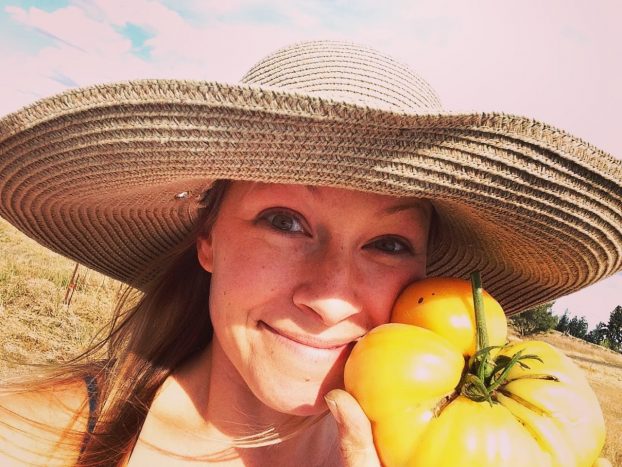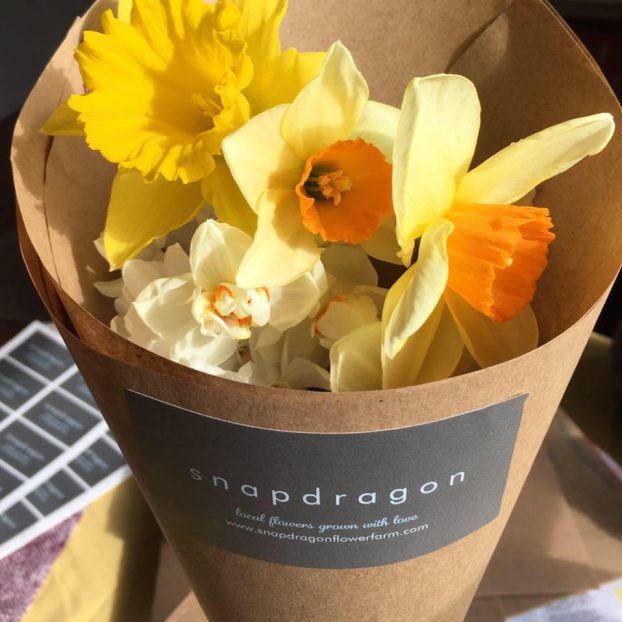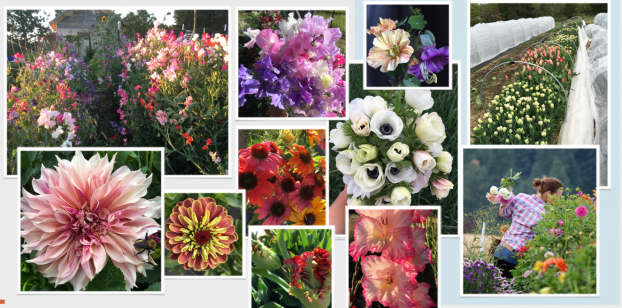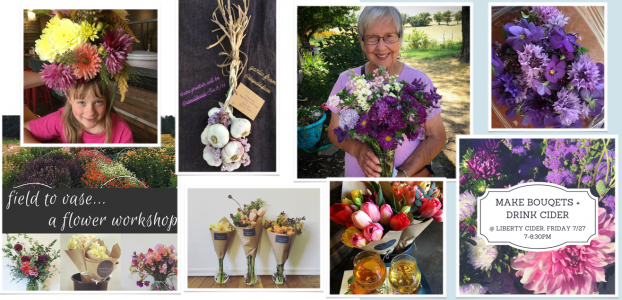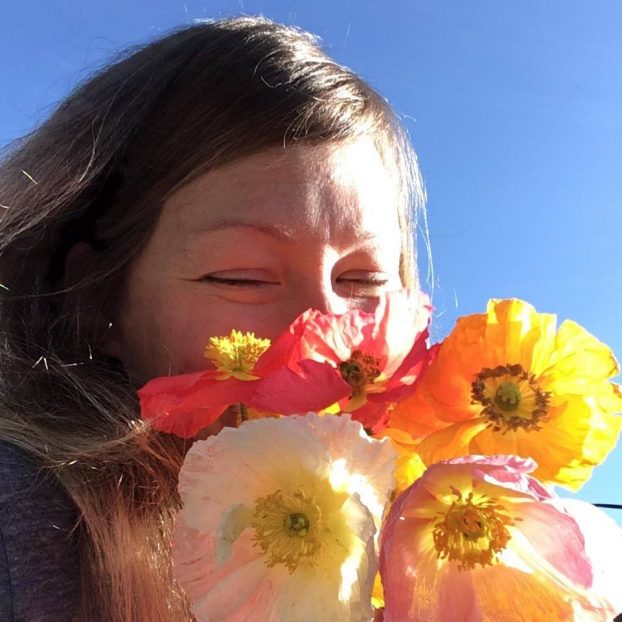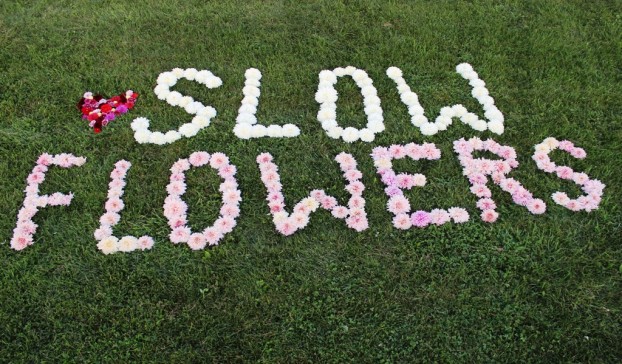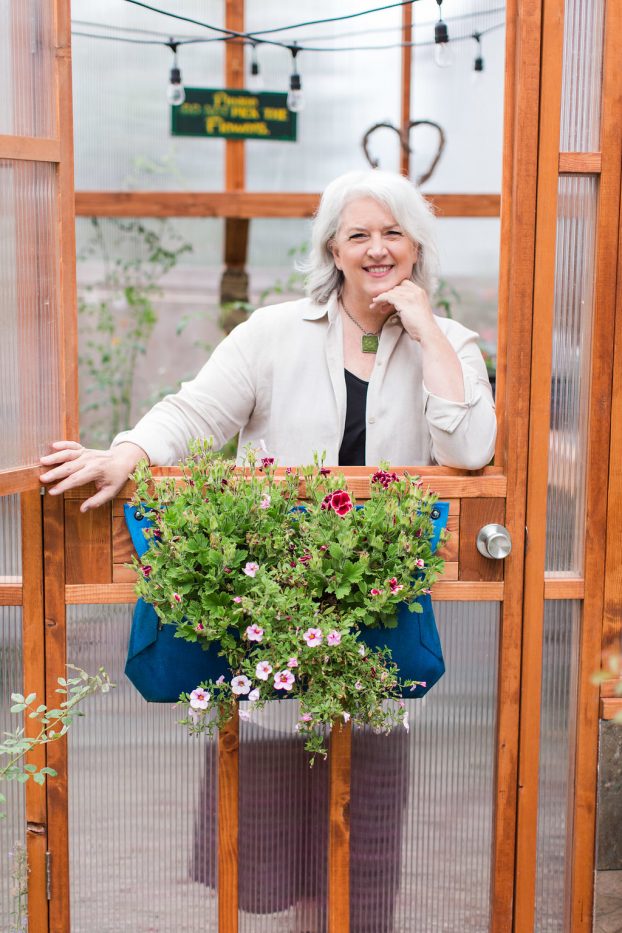Podcast: Play in new window | Download
Subscribe: Apple Podcasts | Podcast Index | RSS | More
Over the past week, I’ve had several rewarding encounters with flower farmers, floral designers and avid flower enthusiasts who are eager for inspiration and encouragement about our vibrant Slow Flowers Movement and what it means for their own relationships with flowers.
Each new connection is encouraging and inspiring.
While we have a long way to go in achieving my goal of putting local flowers on the top of customer’s wish lists and supporting florists who want local and seasonal choices in the floral marketplace, it’s notable to see how much has changed since the first week of the Slow Flowers Podcast, back in 2014.
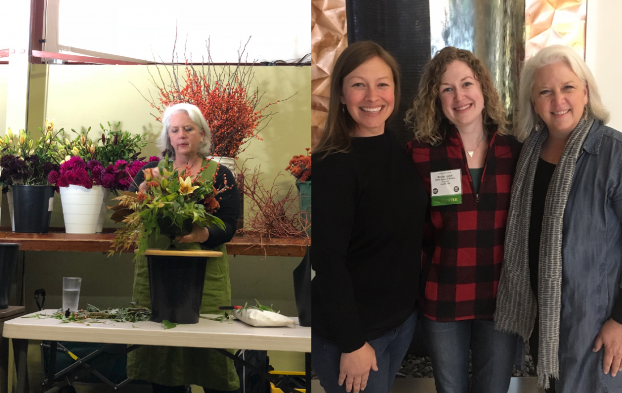
Left: Whatcom Horticultural Society’s floral design workshop; Right: Beth Mort (Snapdragon Flower Farm), Debra Prinzing and Katie Lynd (Washington Dept. of Agriculture) at the Tilth Conference
Late last week, I was joined by more than 40 highly motivated members of the Whatcom Horticultural Society in Bellingham, Wash., where on November 8th I led a floral design workshop using only Pacific Northwest-grown botanicals — at “Brews and Bouquets.”
THANK YOU to everyone who helped to make that experience a huge success for the Hort society, who used the evening as a members’ only bonus. I’m especially grateful to the staff and flower farmers of the Seattle Wholesale Growers Market who went the extra mile to help me source 1,000 stems of flowers for the worksho
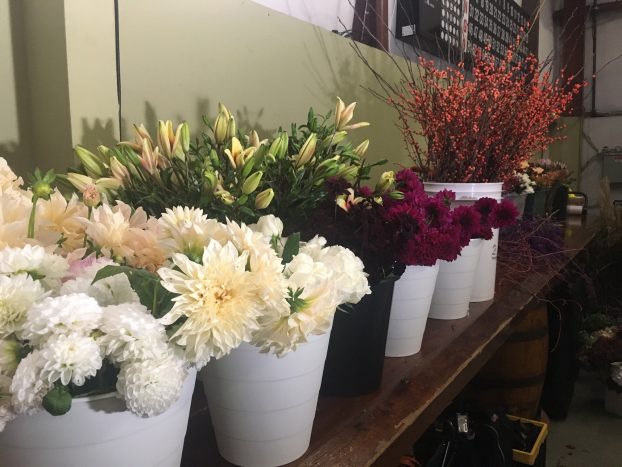 As I said, it took place on November 8th; the threat of frost was upon us and at times as the date approached, I panicked about the availability of fresh, seasonal and local floral options.
As I said, it took place on November 8th; the threat of frost was upon us and at times as the date approached, I panicked about the availability of fresh, seasonal and local floral options.
Those talented flower farmers really came through with dozens of dahlias, mums, chocolate cosmos, orange Ilex, roses and sprays, as well as lilies. A sweet haul, some of which you can see above — thanks to Crowley House Flower Farm, Charles Little & Co., Sonshine Farm, Peterkort Roses, Everyday Flowers, Cairn Farm and others.
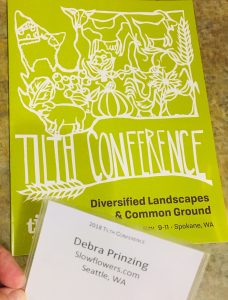 And from Bellingham, I headed to Spokane, in Eastern Washington, on Sunday, where I joined two smart and talented women to be part of a panel at the annual Tilth Conference.
And from Bellingham, I headed to Spokane, in Eastern Washington, on Sunday, where I joined two smart and talented women to be part of a panel at the annual Tilth Conference.
Produced by the Tilth Alliance, a coalition of people committed to sustainable farming in Washington and building an ecologically sound, economically viable and socially equitable food system, the conference this year recognized floral agriculture as an important facet of our state’s larger farming community by adding a panel presentation called “Marketing Your Local Fresh Cut Flowers: Consumer Research and Industry Trends,” to the program.
The panel was led by Katie Lynd of Washington State Department of Agriculture’s regional markets program. She shared highlights of phase one of “A Collaborative effort to Advance Washington State Cut Flowers,” a USDA specialty crop block grant being administered by WSDA and the Washington Farm Bureau. Slow Flowers is an industry stakeholder in that block grant.
Katie presented the results of the grant’s initial quantitative and qualitative consumer research and she asked me to share highlights of the 2019 Slow Flowers Floral Insights and Industry Forecast, the entire report of which you’ll hear on January 2, as part of the New Year’s first Slow Flowers Podcast episode.
She also invited today’s guest, Beth Mort, owner of Snapdragon Flower Farm in Spokane. I’m so pleased that Beth was part of the panel because she brought real-life experience and her personal story to the room.
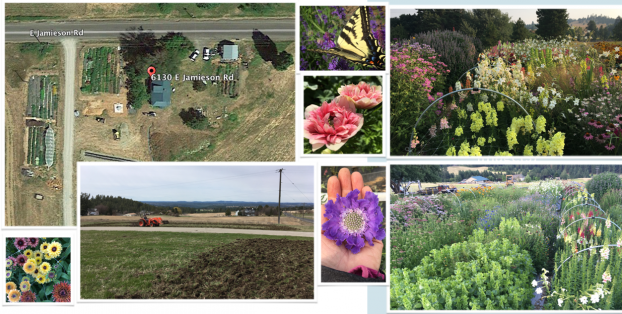
A slide from Beth’s presentation at the Tilth Conference, featuring highlights and flowers from her farm.
After our panel presentation was over, Beth and I found a quiet corner of the conference to record a full episode so you can hear her story as well.
Beth was raised near Tum Tum, Washington, just outside of Spokane, where she started gardening with her mother at an early age.
She says, “I love to learn, and gain knowledge from each person, plant and animal I meet.” As an undergraduate, Beth studied ecology and plant & mushroom taxonomy at The Evergreen State College, and followed this with a Master’s in Urban and Regional Planning from Eastern Washington University.
She holds a Permaculture Design Certificate from the Bullock’s Farm on Orcas Island.
Snapdragon Flower Farm is located in south Spokane near Tower Mountain. In early 2017, Beth and her husband Mike moved to the land that they rent and leasing from Heron Pond, which they call their “parent” farm.
As the 2018 growing season comes to a close, Snapdragon Flower Farm wraps its second full year in flowers.
Beth says she is grateful not just to Heron Pond but also for Urban Eden Farm, which graciously allowed her to test out growing flowers in 2016.
Beth is also owner of Zinnia Permaculture Design, a Spokane-based garden design company with a focus on food production & building healthy soil while creating beauty and resiliency in the landscape. She blends permaculture principles, long-standing food gardening concepts and client vision to produce a dynamic design clients can use to accomplish their goals.
As you will hear in our conversation, operating Zinnia Designs allowed Beth to generate some income from her expertise while incubating her dream of establishing a flower farm in Spokane. She applies the same sustainable practices used in food gardening to flower farming.
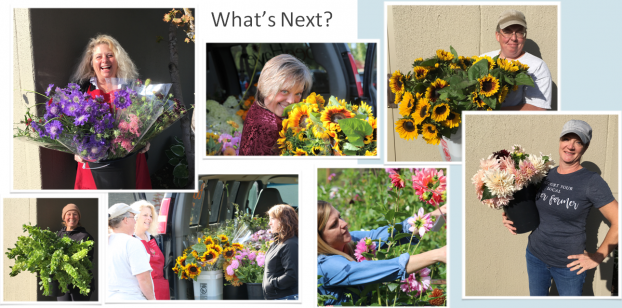
Snapdragon Flower Farm’s clients, colleagues and community — building an important regional hub for local flowers.
Beth is part of a small group of flower folks in Spokane who recently started a Facebook group for Inland flower farmers and florists.
Here’s how you can find and follow Snapdragon Flower Farm:
Snapdragon Flower Farm on Facebook
Snapdragon Flower Farm on Instagram
Read more about Beth in the Spokesman Review
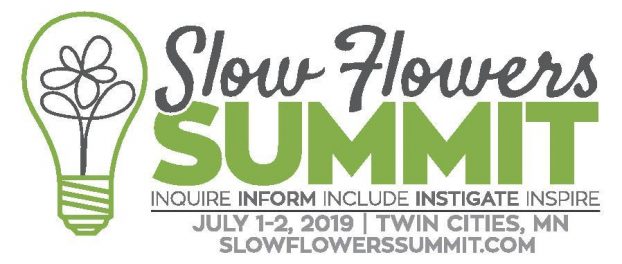 I want to encourage you to visit the Slowflowerssummit.com site to learn more about the amazing program, people and flowers you’ll engage with next summer. It’s not too early to save the date and secure your seat! Slow Flowers members receive special discount pricing and everyone receives $100 off with the Early Bird rate, on sale now!
I want to encourage you to visit the Slowflowerssummit.com site to learn more about the amazing program, people and flowers you’ll engage with next summer. It’s not too early to save the date and secure your seat! Slow Flowers members receive special discount pricing and everyone receives $100 off with the Early Bird rate, on sale now!
 We have a vital and vibrant community of flower farmers and floral designers who together define the Slow Flowers Movement.
We have a vital and vibrant community of flower farmers and floral designers who together define the Slow Flowers Movement.
As our cause gains more supporters and more passionate participants who believe in the importance of the American cut flower industry, the momentum is contagious.
I know you feel it, too.
I value your support and invite you to show your thanks and with a donation to support my ongoing advocacy, education and outreach activities.
You can find the donate button in the column to the right.
The Slow Flowers Podcast has been downloaded more than 380,000 times by listeners like you. Thank you for listening, commenting and sharing – it means so much.
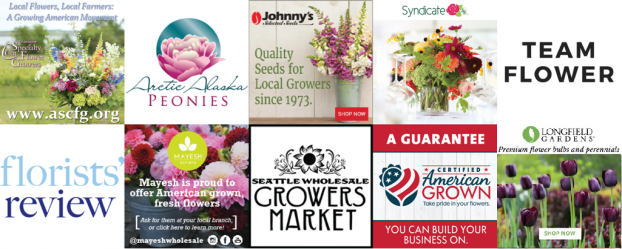 Thank you to our sponsors who have supported Slow Flowers and all our programs.
Thank you to our sponsors who have supported Slow Flowers and all our programs.
Florists’ Review magazine. I’m delighted to serve as Contributing Editor for Slow Flowers Journal, found in the pages of Florists’ Review. It’s the leading trade magazine in the floral industry and the only independent periodical for the retail, wholesale and supplier market.
Arctic Alaska Peonies, a cooperative of passionate family farms in the heart of Alaska providing bigger, better peony flowers during the months of July and August. Visit them today at arcticalaskapeonies.com
Seattle Wholesale Growers Market, a farmer-owned cooperative committed to providing the very best the Pacific Northwest has to offer in cut flowers, foliage and plants. The Growers Market’s mission is to foster a vibrant marketplace that sustains local flower farms and provides top-quality products and service to the local floral industry. Find them at seattlewholesalegrowersmarket.com
Longfield Gardens provides home gardeners with high quality flower bulbs and perennials. Their online store offers plants for every region and every season, from tulips and daffodils to dahlias, caladiums and amaryllis. Visit them at longfield-gardens.com.
Syndicate Sales, an American manufacturer of vases and accessories for the professional florist. Look for the American Flag Icon to find Syndicate’s USA-made products and join the Syndicate Stars loyalty program at syndicatesales.com.
Johnny’s Selected Seeds, an employee-owned company that provides our industry the best flower, herb and vegetable seeds — supplied to farms large and small and even backyard cutting gardens like mine. Check them out at johnnysseeds.com.
Association of Specialty Cut Flower Growers. Formed in 1988, ASCFG was created to educate, unite, and support commercial cut flower growers. It mission is to help growers produce high-quality floral material, and to foster and promote the local availability of that product. Learn more at ascfg.org
Mayesh Wholesale Florist. Family-owned since 1978, Mayesh is the premier wedding and event supplier in the U.S. and we’re thrilled to partner with Mayesh to promote local and domestic flowers, which they source from farms large and small around the U.S. Learn more at mayesh.com.
Certified American Grown Flowers. The Certified American-Grown program and label provide a guarantee for designers and consumers on the source of their flowers. Take pride in your flowers and buy with confidence, ask for Certified American Grown Flowers. To learn more visit americangrownflowers.org.
And the Team Flower Conference – a professional floral event where flower lovers from all over the world gather for networking, learning, and celebration. It’s a special time for the floral industry to come together and whether you’re a farmer, designer, wholesaler, or just love flowers, you’re invited to attend as Team Flowers dreams big for the industry’s future. Head to teamflower.org/slowflowers to learn more about the 2019 conference in Waco, Texas!
I’m Debra Prinzing, host and producer of the Slow Flowers Podcast.
Next week, you’re invited to join me in putting more American grown flowers on the table, one vase at a time. And If you like what you hear, please consider logging onto iTunes and posting a listener review.
The content and opinions expressed here are either mine alone or those of my guests alone, independent of any podcast sponsor or other person, company or organization.
The Slow Flowers Podcast is engineered and edited by Andrew Brenlan. Learn more about his work at soundbodymovement.com.









